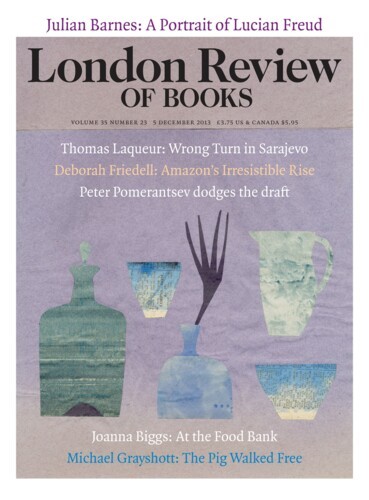At noon on 25 August 1968, eight men and women walked out onto Red Square and unfurled a banner: ‘For your and our freedom’. They were protesting against the Soviet invasion of Czechoslovakia: eight people out of an empire of 250 million. Natalya Gorbanevskaya was the most famous and most controversial of them, because she took her baby with her. Afterwards she spent three years in punitive psychiatric wards, force-fed haloperidol. In 1975 she emigrated to Paris, where she died last Friday. The eight protesters were dissident heroes. ‘They cleansed our conscience,’ my parents told me.
Peter Pomerantsev
Peter Pomerantsev’s latest book, This Is Not Propaganda, won the 2020 Gordon Burn Prize.
Diary: Sistema
Peter Pomerantsev, 5 December 2013
There are any number of paths and initiations into sistema, the liquid mass of networks, corruptions and evasions – elusive yet instantly recognisable to members – which has ordered the politics and social psychology of Russian civilisation since tsarist times. When I arrived in Moscow to work as a TV producer my initiation took the form of a driving test. I would never pass, my instructor explained, if I didn’t pay a bribe. When I protested that I wanted to pass the test for real he said the traffic police would fail me until I paid up.
‘The Subtleties of Organ Smuggling’, a short story by Serhiy Zhadan, is a series of interconnected sketches set on the EU-Ukraine border, where a rag-tag collection of pining lovers, gypsies and ageing prostitutes try to bluff their way over the Schengen line. As an awkward teenage Hungarian border cop searches through the contraband of Ukrainian women ‘smelling of life and vodka, talking in broken English and broken Russian’, he has to take away their surplus alcohol, take away their electric shavers and chocolate, take away their explosives and hand-grenades, take away their copies of Hustler (for his boss), take away their methylated spirits, cocaine, aromatic sticks smelling of hash, herbal oils with heroin extract for Thai massages, haemorrhoid suppositories, glass jars full of gypsy women’s hair for wigs, fish and human blood in thermos flasks, frozen sperm in empty Kenzo perfume bottles, grey slices of human brain hidden in plastic bags with Russian salad, hot Ukrainian hearts folded into fresh Russian newspapers – all these objects they’re trying to smuggle over the border in their rucksacks, bright canvas hold-alls, fake-leather briefcases and laptop bags.
When the Ukrainian president, Viktor Yanukovich, was a young hoodlum on the make in late 1960s Soviet Donetsk – or so the story goes – he made his first money through the following ruse: he would lurk in a cubicle in a public toilet in winter. When a man came into the cubicle next door, he would wait for the opportune moment, then lean over, grab the man’s expensive fur hat and make a run for it: the victim, caught with his pants down, mid-crap, was in no state to give chase. Whether the story’s entirely true or not – Yanukovich was definitely a hoodlum and served two terms in prison, for robbery and assault, in 1967 and 1970 – it captures something of his operating methods.
Sergey was a blind football hooligan. I got to know him when I was researching a TV show about people overcoming tough challenges. He supported Dynamo Moscow. Every weekend he would take his place in the stands among the hardcore fans behind the goal. He didn’t listen to a radio as most blind supporters do. He told me he could feel what was going on during the game with an ‘inner football vision’. Dynamo Moscow supporters are famous for being among the most racist and neo-nationalist and Sergey was no exception: I can hear those churki in the street. I can hear their filthy language in the metro. My yard used to be full of the sound of Russian… When I hear those churki I just come up and take a swing. Just like that. I saw him in a fight once, swinging wide and wildly. But when he connected it was powerful. (Churka, literally ‘block of wood’, is an offensive term for someone from the Caucasus or Central Asia.)
Podcasts & Videos
Peter Pomerantsev, Marina Hyde and Carl Miller: This is Not Propaganda
Peter Pomerantsev
Peter Pomerantsev’s latest book, This is Not Propaganda, travels the world to investigate why we can no longer believe what we say, or say what we believe. He talks about here with Marina Hyde and Carl...
Diary: European Schools
Peter Pomerantsev
Peter Pomerantsev reads his diary about his time in the 'English section' at the European School in Munich.
Diary: Iammmmyookkraaanian
Peter Pomerantsev
Peter Pomerantsev reads his piece on the images and myths of Maidan.
Read anywhere with the London Review of Books app, available now from the App Store for Apple devices, Google Play for Android devices and Amazon for your Kindle Fire.
Sign up to our newsletter
For highlights from the latest issue, our archive and the blog, as well as news, events and exclusive promotions.


